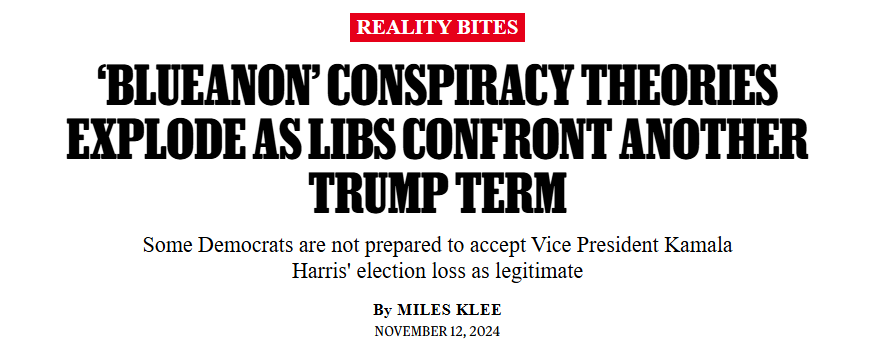While the Capitol Riot of 2020 was followed by odd theories, some Democrats seem determined to win the Conspiracy Contest in 2024.
In the days following the 2024 US Presidential Election many Democrats and left-wing activist have adopted election conspiracy theories that eerily resemble the Q-Anon movement of 2020-2021. Despite years of criticizing the right for unfounded claims of election fraud and claims Trump would return to office in late 2021 (propagated by disgraced attorney Lin Wood), factions within the left have begun peddling their own outlandish theories. These fables serve to further destabilize public trust in the now shamed Democrat Party in the eyes of everyone who hasn’t joined the cult. Among the most bizarre claims are allegations that Elon Musk, through his Starlink satellite network, somehow rigged elections to favor Donald Trump. Equally perplexing is a conspiracy circulating that Kamala Harris will in fact take office in January 2025. These narratives reveal a sort of pathological paranoia within leftist circles and underscore how bad actors on both sides can weaponize conspiracy theories.
The theory involving Elon Musk and Starlink is a prime example of Democrats desperation to assign blame for the failure of their own messaging. According to some left-wing influencers, Musk’s Starlink satellite network— an internet service provider—was used to manipulate voting systems in favor of Trump. While absolutely zero evidence supports such claims, the narrative reflects a deep mistrust of Musk, whose recent acquisition of X (formerly Twitter) and criticisms of the Democratic establishment have made him a target for online commentators and politicians alike. By painting Musk as a puppet master rigging elections, these conspiracy theorists fuel the exact kind of paranoia they once condemned and mocked on the fringe of the MAGA movement.
The theory that Elon Musk used Starlink to rig elections for Donald Trump is utterly ludicrous because it lacks any basis in fact or evidence and demonstrates a fundamental misunderstanding of how Starlink and elections work. Starlink is a satellite-based internet service designed to provide connectivity to remote areas, not to interface with or manipulate voting systems. Voting machines in the United States are not connected to the internet during elections, making such interference technologically impossible. Furthermore, election infrastructure is decentralized, with each state running its own system, further complicating any hypothetical large-scale manipulation. Claims targeting Musk seem more like a reaction to his perceived political leanings and public statements rather than a credible allegation. This conspiracy theory exemplifies how political paranoia can lead to outlandish narratives that undermine rational discourse and distract from real issues affecting elections.
The Kamala Harris conspiracy, meanwhile, represents an even stranger departure from reality. Some Democrats claim that behind closed doors, the Biden administration is preparing to transfer power to Harris in January, bypassing constitutional processes. This theory plays into long-standing fears on the left of an authoritarian power grab—ironically echoing QAnon’s predictions of secret coups. While this narrative is undoubtedly fringe, its traction within certain online spaces such as TikTok highlights the left's growing reliance on conspiratorial thinking as a tool for coping with political defeats. For most Americans who don’t belong to either Party, these developments reaffirm the danger of centralized power and partisan echo chambers. When fanatics embrace baseless claims to rile up their base, the real loser is the concept of democracy itself.

The theory that Kamala Harris will take office in January is both absurd and dangerous, eroding trust in the constitutional framework of government. For Harris to assume the presidency following both an electoral and popular defeat would require nothing short of a coup, a scenario for which there is no precedent. This conspiracy ignores the transparency and accountability built into the U.S. political system, the very checks and balances that prevent such an abuse of power. It fuels paranoia and division, encouraging distrust in democratic institutions while distracting from genuine policy debates and governance challenges. Those perpetuating such unfounded narratives proponents sow chaos, undermining the rule of law, and threatening the peaceful transition of power, the very thing Democrats ceaselessly hyperventilate about.
The lessons Democrats need to take from the 2024 election are three-fold: 1) Learn to lose gracefully 2) Learn how Democracy actually works, and 3) Stop the exploitation of minority groups for political gain. Democracy thrives on the peaceful transfer of power and the willingness to accept electoral outcomes, even when they are unfavorable. Instead of indulging in conspiracy theories or scapegoating, Democrats should reflect on their policies and messaging to understand why voters chose differently. Additionally, minority groups should not be treated as monolithic voting blocs or used merely as tools for political advantage; genuine engagement and addressing their diverse concerns are vital for building trust. By demonstrating integrity in defeat, respecting the will of the electorate, and prioritizing authentic representation, Democrats can strengthen their credibility and better position themselves for future, embracing what they can be, unburdened by what they have been.
As an Independent, I congratulate Republicans on their electoral victory, which reflects a significant shift in the political landscape and their growing ability to connect with a more diverse electorate. By reaching out to minority groups they have historically struggled to resonate with, Republicans have demonstrated a willingness to broaden their appeal and engage with voters on shared values, economic priorities, and cultural issues. This evolution underscores the power of inclusion and dialogue in building a coalition that transcends traditional partisan divides. Their success shows that a commitment to listening, adapting policies, and addressing the needs of all Americans can yield meaningful results, fostering a political environment where every voice is valued and represented. As Republicans move forward, this victory serves as an opportunity to continue strengthening these relationships and ensuring their platform reflects the aspirations of a diverse, yet united, nation.
Will Democrats riot at the Capitol or try to thwart Trumps return to power? We’ll all have to wait and see.









